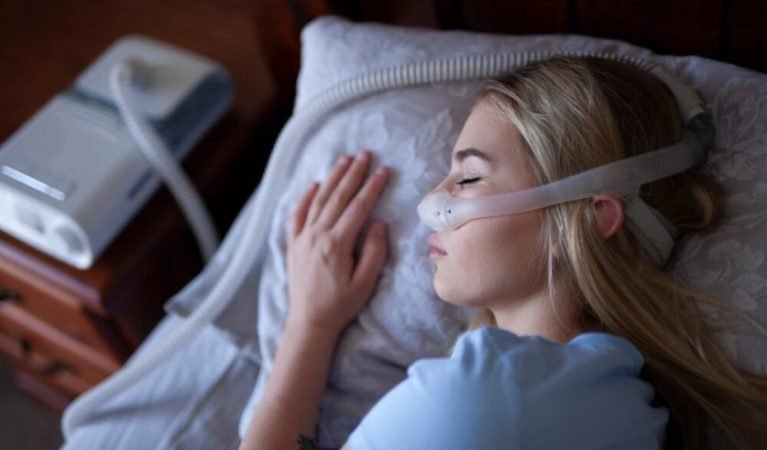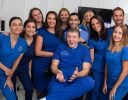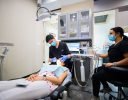
There are several non-invasive treatment options for sleep apnea, some of which produce more effective results than others. Non-invasive treatments can fall into two categories: positive airway pressure (PAP) devices and oral appliances. Visit a sleep apnea clinic in Houston to determine the best treatment option.
Continuous Positive Airway Pressure (CPAP):
CPAP is one of the most effective treatments for OSA. Sleep apnea dentists recommend this method to people with moderate to severe obstructive sleep apnea. Usually, professionals attach a CPAP machine to the patient’s face using a tube leading to a mask that covers the mouth, nose, or nose. After that, the CPAP machines blow air into the sleeper into the patient’s airway to unblock it to provide a good sleep.
However, CPAP is not much effective in treating central sleep apnea. Sleep apnea dentists in Houston combine oxygen with a CPAP machine during the treatment procedure of CSA or mixed sleep apnea. Generally, CPAP machines produce air blows at a constant rate. Doctors regulate them to provide an average speed to the sleeper. Doctors can recommend other options if the patients cannot tolerate the continuous pressure. Visit sleep apnea clinics near me to gather more information.
Bilevel Positive Airway Pressure (BiPAP):
If the patients feel uneasy with the CPAP machine, sleep apnea dentist in Houston may recommend a bilevel positive airway pressure (BiPAP or BPAP) machine. The machine’s functions are similar to a CPAP machine. Professionals connect them to the patients’ faces using a tube and mask. Then regulate the device to offer a constant air pressure to keep the airway open. Although, a Bilevel Positive Airway Pressure (BiPAP) machine produces air blows at high pressure during the inhale and lower pressure when the patient exhales. On the other hand, CPAP delivers constant air pressure during the entire process.
This unique feature makes it popular among patients, especially those with difficulty exhaling while streaming higher pressure air from the CPAP machine. Moreover, doctors recommend this machine to patients with severe obesity or other health issues like hypoventilation and chronic obstructive pulmonary disease.
Automatic Positive Airway Pressure (APAP):
Automatic Positive Airway Pressure (APAP) machines also function in the same way as a CPAP does. But the only difference is that it automatically adjusts the air pressure. Additionally, It adjusts the air pressure according to the sleeping positions of the patients. This feature makes it more comfortable to use. Patients might need different air pressure levels at night at differnt times according to their sleeping stage, position, and amount of congestion.
APAP machines automatically utilize a computer algorithm and pressure sensors to determine the required air pressure level. Therefore, an APAP machine functions better in all ways to confirm its efficiency.
Adaptive Servo-Ventilation (ASV):
Doctors recommend the usage of this machine for patients with primary-stage sleep apnea. ASV is similar to PAP therapy releasing air through the tube and the mask. It produces customized air blows in real-time to respond to central apneic events. According to reliable sources, ASV may harm the patients resulting in certain types of advanced heart failure.
Doctors may also recommend Expiratory Positive Airway Pressure (EPAP) and Oral Appliances to deal with moderate to severe sleep apnea. Suppose you think you are suffering from sleeping disorders. In that case, you should make an appointment with a local specialist for a precise diagnosis and treatment.
YOU MIGHT ALSO LIKE
ABOUT ME

Welcome to my blog Artcle slurp. We share latest article for all niche. If you want to publish your article then mail me on articleslurpblog@gmail.com
Jane Hicks
CATEGORY
- 31Win Brasil
- 31win Brazil
- 21win India
- 21WIN Official In Russia
- 111win Turkiye
- 51win uzbekistan
- 11winRussia
- 4Automotive
- 58BLOG
- 168Business
- 16casino
- 6casino en ligne fr
- 4casino onlina ca
- 1casino online ar
- 3casinò online it
- 19Fashion
- 10Gaming
- 252Health
- 11Interior
- 2Kasyno Online PL
- 1king johnnie
- 24Lifestyle
- 3Mostbet Russia
- 12Moving
- 4online casino au
- 11Pet
- 2pinco
- 1Ramenbet
- 10Real Estate
- 2ricky casino australia
- 19Shopping
- 1sweet bonanza TR
- 6Travel
- 1verde casino hungary
- 1Vovan Casino
- 1Комета Казино









